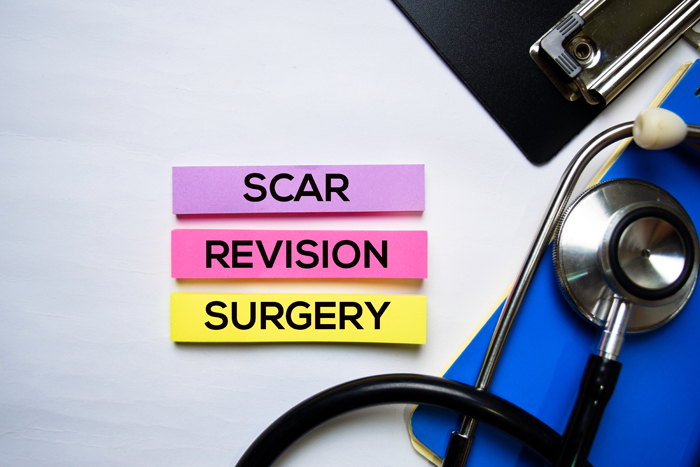Scar Revision Treatment & Diagnostics in Chembur, Mumbai
Scar Revision
Scar revision is a medical procedure that involves minimizing a scar to being barely visible on the skin. Scars are left behind due to injuries, accidents, disfiguration and discoloration.
There are different methods for scar revision. There are non-invasive methods and surgical methods - all these include laser therapy, ointments or a combination of various scar revision methods.

What is scar revision?
The term originates from the Greek word, ‘eskharra’, which means scar. In simple terms, a scar is defined as a mark of blemish that forms when your skin is healing from a wound or injury. A scar is more visible if your wound goes into the deep layers of your skin.
While scars cannot be avoided due to injuries or a wound, scar revision can improve the appearance of your scar to a large extent.
To know more, you can search for a plastic surgery doctor near you or a plastic surgery hospital near you.
What are the types of scars?
There are different types of scars that can be improved using scar revision surgery. These include:
- Hypertrophic scars - These are scars that are formed directly on the wound. They are red or raised in nature and cause discomfort.
- Discoloration or surface irregularities - These are minor scars that result from acne, minor injuries or surgical cuts.
- Keloids - They are larger than hypertrophic scars and spread beyond the original wound site. They can develop on any part of your body but commonly on your face, neck or chest.
- Contractures - These are scars that result from a loss of tissue. The skin and tissue restrict movement and pull when the wound is healing.
When do you need to see a doctor?
After the surgery, if you see swelling at the site of surgery or experience pain, excessive bleeding or discoloration, you should consult your plastic surgeon soon. If you want to get rid of any type of the scars mentioned above, see your doctor too.
You can request an appointment at Apollo Spectra Hospitals, Chembur, Mumbai.
Call1860 500 2244 to book an appointment.
What are the risks associated with scar revision?
Before you undergo scar revision surgery, you must understand the risks involved in the surgery. These include:
- Risks of anesthesia
- Infection
- Excessive bleeding
- Numbness
- Loss of skin
- Swelling
- Excessive pain
How is the surgery conducted?
Before you go for the scar revision surgery, your plastic surgeon will recommend a few tests. If you smoke or drink, your doctor will ask you to stop doing so before the surgery. Stop taking any medication you were taking before the surgery. Before you go for the surgery, speak to your doctor and understand the type of anesthesia that will be administered for the surgery and what post-operative recovery entails.
Procedure
- Anesthesia - Before the surgery is performed, your doctor will administer either local or general anesthesia according to what is suitable for you.
- Treatment - Depending on the depth, size and location of your scar, treatments are determined. These include gels, creams and compression that can help with wound healing. Gels are good for healing discolored scars or for improving pigments caused by scars. Then you have surgical methods. These include:
- Laser therapy - Using a laser to make changes to the surface of your skin to allow new and healthy skin to grow. Chemical peel solutions - These solutions invade your skin to remove irregular pigments and skin.
- Dermabrasion - This procedure includes polishing your skin.
- Closing the cut - This step of the procedure includes closing the cut made during the surgery. Tissue substitutes are used to close a cut if enough healthy tissues are not present. There is another method called flap closure which includes positioning your scar elsewhere to make it less visible.
Recovery
The swelling or pain that comes after the surgery will take up to two weeks to heal. After that, it will take a few weeks for the scars to heal and become less conspicuous.
Conclusion
Depending on the size, depth and location of your scar, your doctor may go for non-invasive methods such as ointments or gels or may go for laser therapy and dermabrasion.
It depends on the follow-ups with your doctor. If the scar is healing very fast, then you may return to work after a few weeks.
It depends on the severity of your scar. It may take between a few weeks to a few months.
Risks include infection, bleeding, hematoma, pain or complete numbness.
Our Top Specialities
NOTICE BOARD
CONTACT US
CONTACT US
 Book Appointment
Book Appointment


.svg)
.svg)
.svg)
.svg)








